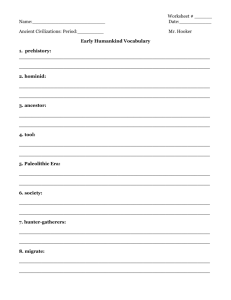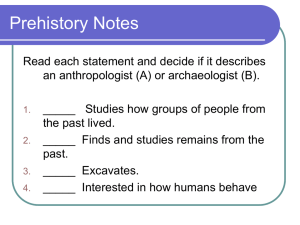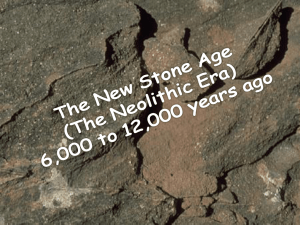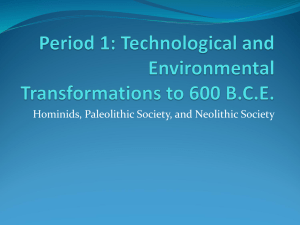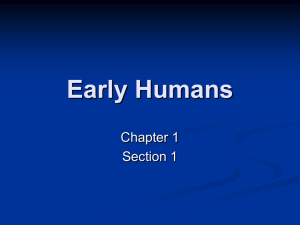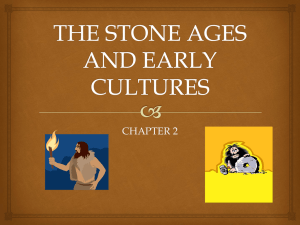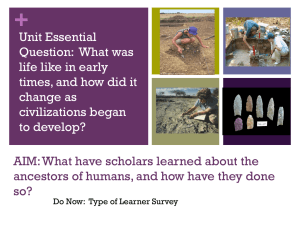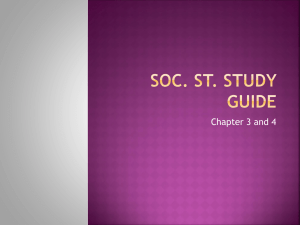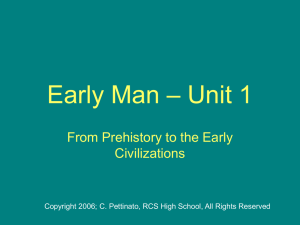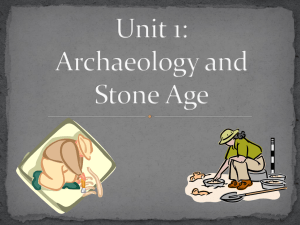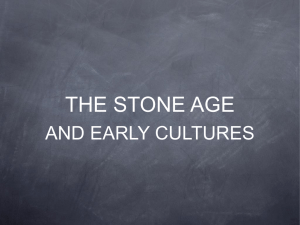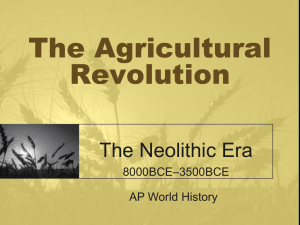Chapter 1 Review Game - South Shore International College
advertisement
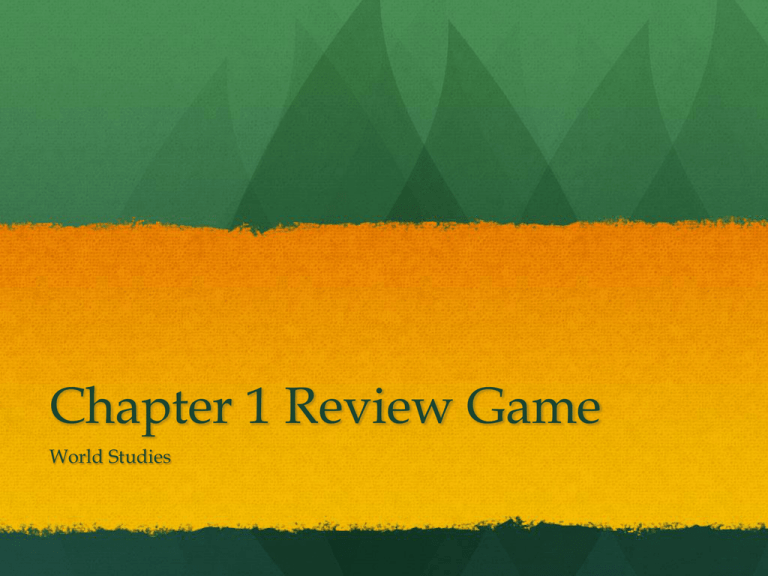
Chapter 1 Review Game World Studies Bell Ringer We are playing a review game today! You may have out your notebook to take any notes you want. You can also look through your notes to help you teammates if they need it. Stay tuned for the rules and regulations for today’s game! Rules and Regulations Each side of the room will be a team. You will send one representative up to the front at a time. If your team member gets the question correct, your team gets a point. We will stay on the same question until someone gets it correct. Ring your bell and that person gets to answer first. If they are wrong the other person gets a chance. If they are wrong, two more players will get a chance. You may phone a friend, consult Mr. Beluse, or Ms. Bekker, do a 50/50, or change the question. (The question will be repeated later) What was the Paleolithic Period? The era of history in which writing developed The era of prehistory that lasted from 2 million B.C. to about 10,000 B.C, also called the Old Stone Age The era of prehistory in the skill of farming developed The final era of prehistory lasting from 10,000 B.C. to the end of prehistory also called the New Stone Age What was the Neolithic Period? The era of history in which writing developed The era of prehistory that lasted from 2 million B.C. to about 10,000 B.C, also called the Old Stone Age The era of prehistory in the skill of farming developed The final era of prehistory lasting from 10,000 B.C. to the end of prehistory also called the New Stone Age What is a Nomad? A person who raises animals in order to survive A group of people who claim a common ancestor A person who moves from place to place in search of food A person who lives in an area located by a river What is the Neolithic Revolution? The period of time in which people lived a nomadic lifestyle Period of time in which most herding societies surfaced The period of time during which the introduction of agriculture led people to transition from nomadic to settled life Period of time in which all people were settled What does the term domesticate mean? The process of taming animals and adapting crops so they are best suited for humans The process of taking control of another group of people The movement of animals searching for food or grazing The movement of people searching for food sources What does the word civilization mean? A simple social structure for a village A complex, highly organized social order Societies that develop by rivers Area in which many cities are developed The Neolithic Revolution was created by what? complex religions such as Buddhism and Christianity stone tools used to hunt and gather writing such as cuneiform settled farming with domestication of animals During the Paleolithic Era what were the roles of men and women? Women were the head of the family. Older, rich men had all of the power. Men hunted and women gathered. Men had most of the say in the family unit. During the Neolithic Period how did the roles of men and women change? The roles became more equal in the farming communities. Men began to have more power Women began to have more power. Women’s husbands were chosen by her father. ]According to some anthropologists the practice of burying the dead may be evidence of a belief in what? an afterlife (#Religion) Protection of fortunes (#Economic) ancestor worship (#Social) karma (#Religion) Within what period would archaeologists first begin to find permanent human settlements? The Paleolithic The Classical Era The Bronze Age The Neolithic The religious or spiritual dimension of Paleolithic culture included ::: no ceremonial life. full-time religious specialists. a single belief system based shared by all Paleolithic peoples. a belief amongst some in that the afterlife was similar to life on earth. The Paleolithic period is important for which of the following reasons? Humankind became farmer rather than hunters-gathers. Humankind spread to inhabit all parts of the globe. Population was higher during the Paleolithic era. The First Civilizations appeared during the Paleolithic period. Early agricultural people They all lived longer than huntinggathering peoples. did not suffer from famines. suffered from deadly diseases caught from domesticated animals. had more free time than huntergathers. Where did four boys find ancient cave paintings? Rome, Italy Baghdad, Iraq Lascaux, France Athens, Greece What subject matter did most of cave paintings depict? ancestors animals maps of civilization instructions What use of technology did ancient people use to paint in the caves? Tools for paint brushes Paint for the drawings Lamps for lighting Sanders to flatten surfaces What statement best describes the reading, “The Life and Words of an !Kung Woman”: This primary source is an inside look at the life of a woman from a 20th century hunting-gathering society This primary source is an inside look at the life of a woman from a agricultural society This document is a look inside the life of a woman from the Neolithic Era This document is a secondary source What does “The Life and Words of an !Kung Woman” provide evidence of? Egalitarian societies, societies where men and women were completely equal Religious beliefs, there is a belief in God, or a higher power Capitalistic society, societies where wealth is determined by items of value Monogamy, couples commit their entire lives only to one other person Members of the Bush community were seen as what if they did not share their food with others? selfish stingy protective good husbands According to the reading, marriage in the Bush community can be best described as: Very romantic and independent Happens at an older age for women One in which love grows over time A terrifying experience for most women How does Nisa change after the loss of her husband: She is lonely She remarries and is not scared of marriage She blames God for her loss She feels more empowered
